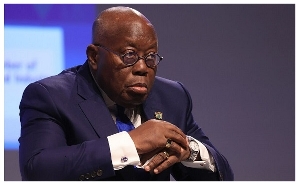 President Nana Addo Dankwa Akufo-Addo
President Nana Addo Dankwa Akufo-Addo
Benjamin Tachie Antiedu, a private legal practitioner, has stated that without caution, individuals might inundate our courts with petitions to prevent the president from assenting to bills they disagree with.
Although he acknowledged that the president did not violate any laws by refusing to sign the anti-LGBTQI Bill, which was passed by Parliament until all ongoing cases were resolved, the lawyer contended that it could set a dangerous precedent for the country.
He explained that the ongoing court cases could prompt people to rush to our courts and file petitions against laws they oppose.
Speaking with Kwabena Agyapong on Frontline on Rainbow Radio 87.5FM, he said the president can cite any reason for refusing to assent to a bill.
He mentioned that the president could one day use a dream as a reason for refusing to assent to a bill, without breaching our laws.
“In my opinion and understanding, the President can cite any reason for refusing to assent to a bill. He can wake up one day and tell us that he had a dream and believes the bill will not help us, and that will be sufficient. The only problem is that in our scenario, when the president makes that decision, it ends there.
However, there are processes involved that ought to be followed. For example, if he refuses to assent, he has a constitutional duty to write back to Parliament and assign his reasons. That is what we are lacking. But the president can cite any reason for refusing to assent.”
It is not compulsory for a president to assent to a bill. That is the power granted to the president. However, the power was entrusted to him by Ghanaians, and so the people will examine and determine if the powers that were granted to you were used to do things in their interests. That is a political matter to be determined through the political process."
"...Whatever decision the president takes in this particular instance is within his powers. But that is why the constitution has also put in place an election where the people will decide if they will vote for you based on the decisions you took.”
He advised caution to avoid future adverse situations.
“Political leadership is subject to accountability. So far, within the law, the president has committed no offence for not assenting to the law. But it could be a bad precedent for all of us because some people could take such steps and file cases over a new law passed. That will not help us. I don’t want to go into the merits of the cases, but in all of this, this can establish a bad precedent that could affect us.
...Imagine we pass a tax law with the hope of raising revenue, then all of a sudden someone drags the matter to court, and the president surprisingly says he will not speak until the matter has been determined. That is why I am saying political leadership is subjected to accountability.”
The Supreme Court on Wednesday, May 8, 2024, indefinitely adjourned the case against the Sexual Rights and Ghanaian Family Values Bill, also known as the Anti-LGBTQ Bill.
The Apex Court found that the documents submitted by the lawyers of the Speaker of Parliament, Alban Bagbin, contained intemperate language.
It thus directed the legal team to file new documents.
Justice Torkornoo, the chair of the panel, said each party has the right to present their case as they wish and admonished the speaker's team, stating, "You have wasted our time and energy for no reason."
Antiedu said the substantive matter has not been addressed, and what occurred on Wednesday was based on preliminary objections.
“The sense of the court is that this is an important matter they want to deal with. We were all happy when this matter was telecast live. But on a more serious note, the international community has more interest in the issue than Ghanaians. The decision to telecast it live may even be for the international community rather than Ghanaians.”